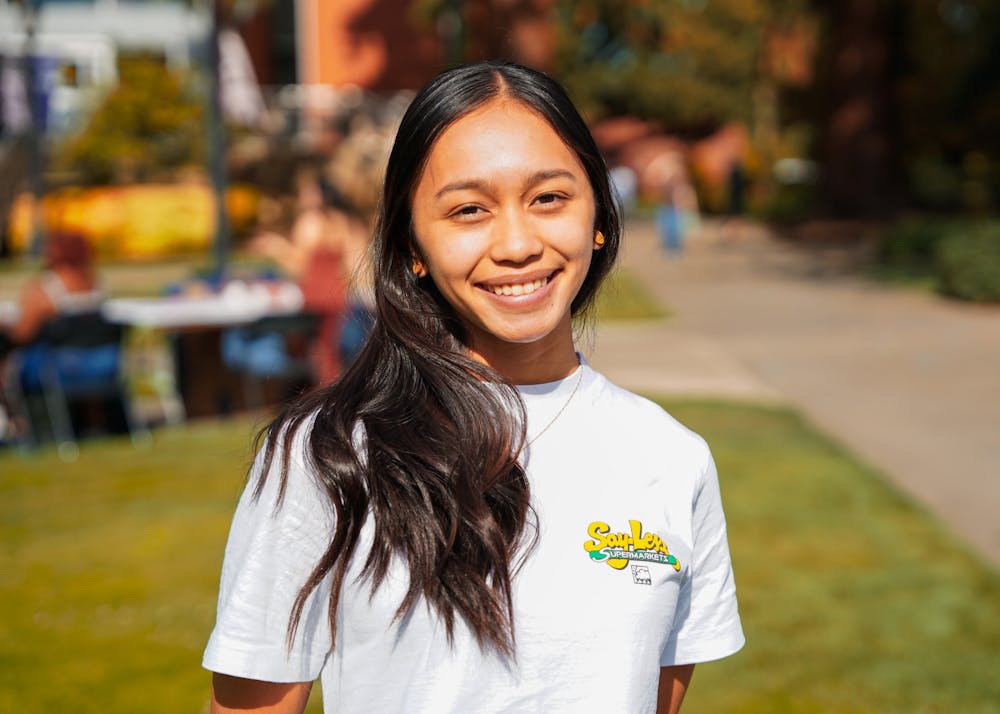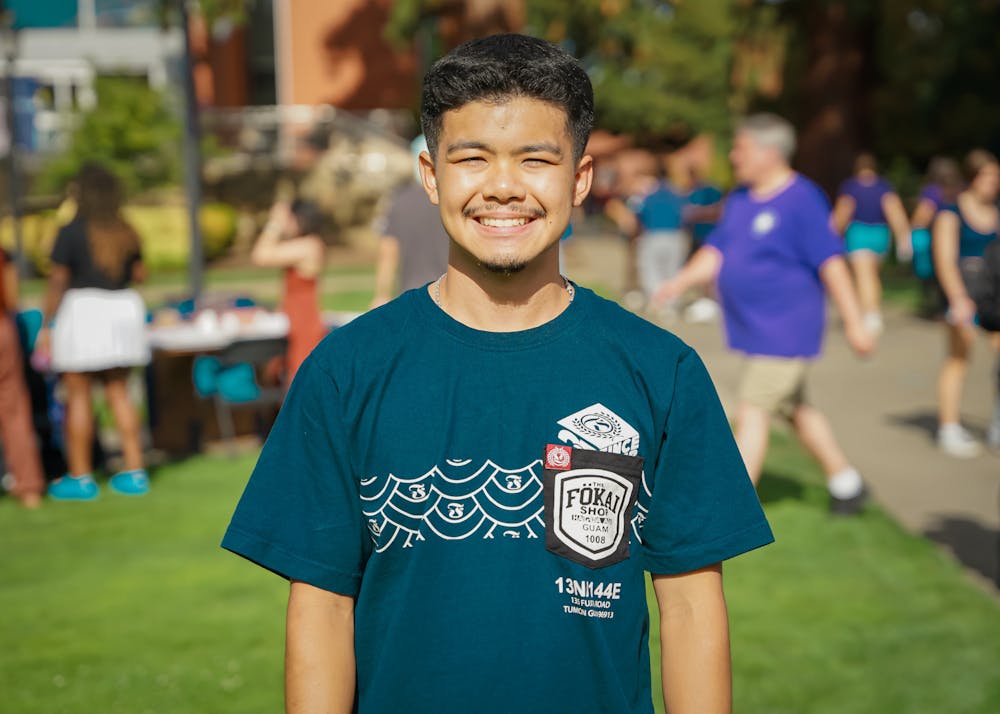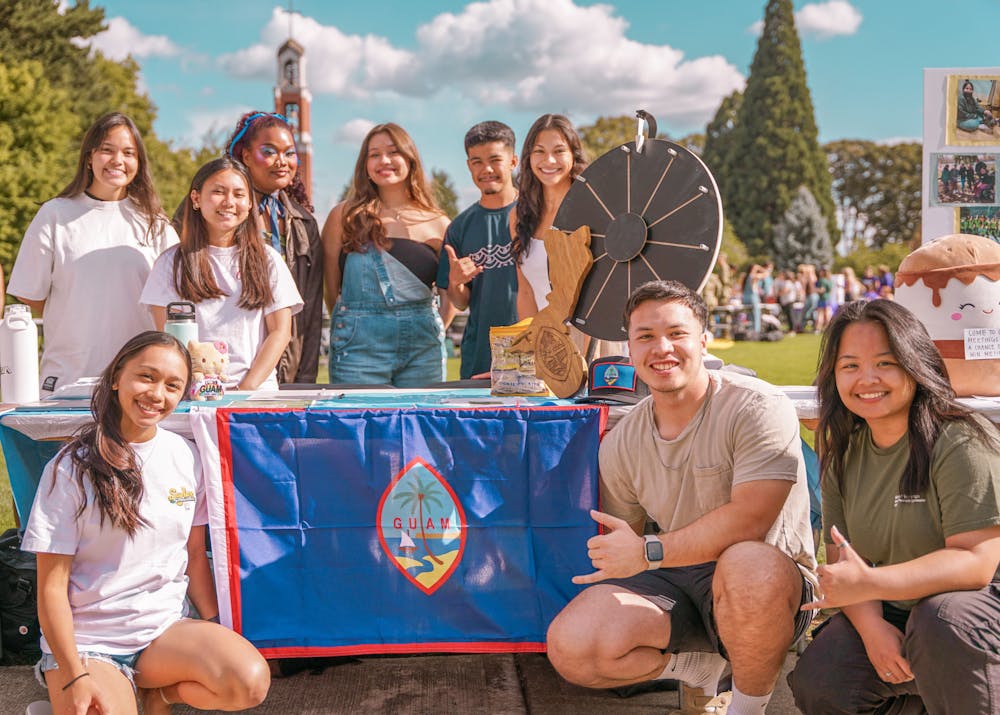When Kieurstyn Camacho first applied to UP, she felt eager to find a community of people from Guam in Portland. She remembers being at a UP-hosted reception back home, getting to hear the president of the Guam Club talk about the large community that supported one another. However, that excitement was cut short once she stepped foot onto campus.
“There was nothing going on at all, no word,” Camacho said. “I felt a little bit lost, I guess you could say.”
Camacho’s freshman year was held online due to COVID-19. When students were finally allowed onto campus her sophomore year, she excitedly looked for the Guam Club to become a member. Instead, she found radio silence.
This fall semester marks the end of the hiatus, and a chance for students from Guam to finally feel a piece of home again. For Camacho, the revival of the club meant she, and students like her, would have a chance at forming a community for support.

President of CHamoru Club Kieurstyn Camacho.
“Not a lot of people can relate to our situation with being far away from home,” Camacho said. “A lot of people will go back home because of homesickness or they didn’t feel a sense of community.”
The CHamoru Club, previously established as the Guam Club, prides itself in providing a sense of community for natives from Guam and the Mariana Islands.
However, after the COVID-19 pandemic, the CHamoru Club was faced with a challenge. What started out as a difficulty finding members for their leadership board resulted in a two-year hiatus.
Camacho and junior Santino Manglona are the newest leaders of the club, marking a new beginning. Initially meeting in a class last semester, Camacho saw an opportunity to bring a new energy to the club with Manglona.

“I feel obligated to do my part and also curate a community here as well for the people from Guam or anyone who’s interested in learning about our culture,” Manglona said.
During the activities fair, Camacho felt inspired from an encounter with a student. Although the student was not from Guam, they felt a connection to their CHamoru grandparents upon signing the club roster.
“She took a picture of her signing it and she's like, ‘my grandparents would be so proud,’" Camacho said. “And that, just kind of hit home.”
Camacho felt “a sense of honor” in being able to bring back a club and connect a fellow student to her own culture and family.
Although they played a vital role in bringing the club back to UP, Camacho and Manglona added that they couldn’t have done it without the help of their board members. For Camacho, it was difficult to find other fellow students from Guam. She had to rely on word of mouth to find fellow CHamoru students to fill leadership positions.
Despite the challenge, Camacho feels optimistic about the board her and Manglona have built and have full faith in their fellow leaders.
“I felt that they're going to contribute to the team, they're going to be passionate about it, they're going to put the work in and we're going to work together,” Camacho said.
The term “CHamoru” refers to the native peoples, language and culture of Guam and the Northern Mariana Islands. This term can even be found on the seal of Guam, with the phrase, “Tano I’ ManChamorro,” or Land of the CHamorus. Although CHamoru is a technical term, the CHamoru identity goes beyond an ethnic/cultural label.
“My success, my failures, how I come back from those failures…” said Camacho. “Everything is Chamoru. It’s my pride and joy.”
The CHamoru culture places a heavy emphasis on the importance of family, according to Manglona. For him, being CHamoru has everything to do with his loved ones.
“During my low points, it’s during those times to where I don’t even have to reach out to family,” Manglona said. “I could already hear their voices cheering me on, especially my relatives that have passed away…Those are definitely keeping me going.”
The CHamoru Club hopes to continue to lead events throughout the school year. Anyone who is interested in the club or their events can join their Engage page or follow their Instagram here.
“We welcome everybody, no matter what,” Camacho said. “We’re trying to create this and revitalize a club and instill passion in people whether or not you’re CHamoru.”
Tiffany Marquez Escobar is a reporter at The Beacon. She can be reached at marqueze25@up.edu.
Julianna Pedone contributed to this story. She can be reached at pedone25@up.edu.








